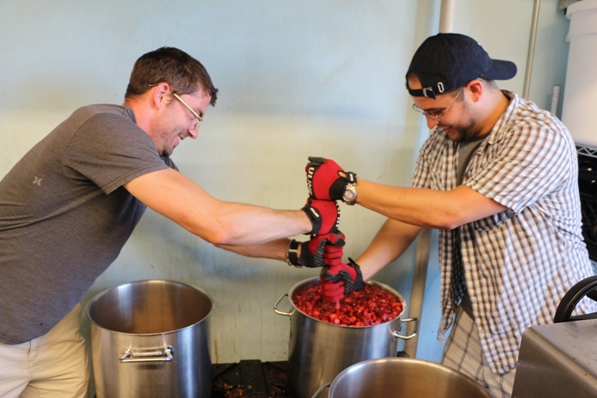By Brad Jones

I set out this summer curious as to how our food is produced and in search of the people producing it. Armed with a little money generously donated to our cause and a whole lot of enthusiasm, my colleague Chris Maggiolo and I traveled 15,000 miles in more than 100 days to investigate the food system. Living in the back of our 20-year-old 20-foot van, we spent time in nearly every state in continental America.
In that time, we worked with just about every kind of artisanal food producer you can imagine (nearly 80 in all). We harvested oysters in Rhode Island and made tortillas in Portland, Ore. We foraged herbs for bitters in the mountains of Colorado and spent the day shrimping off the coast of Houston. We chopped and we cured; we brewed and we baked. We met those enthusiastic to tell their story while others were more laconic. We met fifth-generation farmers who've barely managed to hold on to patrimonial land while green-thumbed others have taken to agriculture for the very first time. We met producers with a profound social or sustainability mission and others who simply wanted to eat or feed their family better.
Related: Consider the farmers
We were fortunate to experience a goat being born in central Virginia and took part in a pig slaughter in Oregon. These are profoundly emotional experiences in their own respective way -- the alpha and omega of life. It's easy to forget the seemingly obvious fact that our food comes not from shelves at the store but is the result of a natural life cycle that includes death and rebirth and that extends to distant (though hopefully not too distant) farms and fields. In the case of meat, this means living breathing animals whose death was necessary to bring our sustenance.
Appreciating this fact is to consume more critically, and for my part, perhaps not to eliminate meat consumption altogether but to certainly take measures to ensure that the meat I do eat is responsibly raised and humanely slaughtered. Once you've experienced the profundity of the cycle firsthand, to do otherwise would be incongruous. I want to take steps to be a little more intentional. I encourage you to do the same, and it can start with the simple act of consuming meat.
Though we may hold romantic notions of "craft," it isn't always what it's made out to be. This pertains to food production in the general sense ("artisanal" bread at Subway comes to mind, the largest fast food chain in the world) but it is especially true, and especially well veiled, in terms of alcohol. For instance, many of the top spirits brands are owned by the same monolithic parent companies.
They buy neutral grain spirits from large distilleries in Indiana. Sometimes they age them elsewhere. Sometimes they run them through another still. Sometimes they just slap on rustic label to give an aura of hand-crafted authenticity. This isn't to say these spirits are necessarily worse for being produced in this manner but it is to reiterate the importance of looking behind the label. We are experiencing a revival of truly small-batch artisanal spirits throughout America. I encourage you to seek out something made with local grains, by local people, feeding into local economies. All stand to benefit, your taste buds included.
Relationships matter. This applies to people, to places, and to products. Never have I been more aware how critical it is to meet a farmer at the local farmers market. Ask questions. For instance, "What exactly are garlic scapes?" And ask for advice. "How would I use them?" These individuals are proud of what they do, and they're labors of love shine through in conversation. It's a contagious sort of enthusiasm. What's more, I encourage you to create not just a relationship of mutual benefit but of one actual friendship. We live in an age that feels quite solitary at times. We can begin to build resilient communities in the most natural way possible, by sharing sentiments.
Get out to the farm. If I learned nothing else from our adventure across America it's that experience is the best educator. I can read how cheese is made a hundred times but just one opportunity to milk a sheep before dawn, to culture curds in a vat and to taste from wheels in odorous caves designed for aging, cheese comes alive with a significance entirely new. This stands for farmers and brewers and bakers (and the rest) as well as cheesemakers.
In the end, I simply encourage you to be curious. Ask thoughtful questions and search for meaningful answers. Don't take things at face value. Experiment! Pick up a couple pots and soil and grow your own herbs. Try (and fail) to make cheese. Try (and fail) to bake bread. Get your hands dirty. You'll feel not only a tangible and edible sense of accomplishment but you'll have acquired a measure of self-reliant contentment. The next time you're in the grocery, you'll be better informed because you asked and answered these questions. You'll appreciate your food, and those who made it, in whole new way. You'll demand more from the food system. And with the help of artisans across America, you'll continue to see it change.
Zester Daily Soapbox contributor Brad Jones is a cheesemonger at Formaggio Kitchen in Cambridge, Mass., and craft enthusiast. He is the co-founder of to cure: a food anthology, which features a behind-the-scenes look at artisanal food production in America.
Top photo: Brad Jones, left, and Chris Maggiolo stirring strawberry preserves at Quince and Apple in Madison, Wis. Credit: Sarah Makoski
More on Zester Daily: